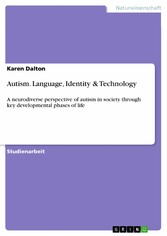Suchen und Finden
Autism. Language, Identity & Technology - A neurodiverse perspective of autism in society through key developmental phases of life
Mehr zum Inhalt

Autism. Language, Identity & Technology - A neurodiverse perspective of autism in society through key developmental phases of life
Studienarbeit aus dem Jahr 2018 im Fachbereich Biologie - Neurobiologie, , Sprache: Deutsch, Abstract: Modern technology is helping change societal views and attitudes towards autism. As an individual with autism transitions from childhood to adulthood they often find it difficult to achieve a healthy sense of identity because of how they communicate and are viewed by wider society. However, by adopting a neurodiverse framework rather than a 'deficit framework'. Many autistics are now able, thanks to online accessibility, to debunk myths and stereotypes about autism that have prevented them from previously participating in all aspects of life, with dignity, that is their humanitarian right. The relationship between language and identity is an intriguing one, partly because debates of language are as inclusive and undetermined as debates on the theories of identity. This debate is further compounded when a person has a neurological condition such as autism. This is a condition whereby an individual has abnormal interpersonal relationships which are related to their emotional facial expressions, gestures and vocalization and cannot seem to recognize the social and body language gestures and signals sent out by other people. They fail to participate in the normal interactions that shape identity. This has a major impact upon the individuals and their families In 2012 research undertaken by the Centers for Disease Control and Prevention in America announced that autism affects 1 in 68 individuals under the age of 21. As Gecas and Burke (1995) state that although some of our self-views are gained by direct experiences with our environment, most of what we know about ourselves is derived from others. Once these direct experiences would have been face-to-fact however the advent of technology at an affordable price in recent years now means that many autistic people have found a voice and a platform online. The berth of their experiences has expanded as barriers have been broken down and the core domains that determine quality of life through childhood to adulthood have helped transform societal attitudes about autism.
Alle Preise verstehen sich inklusive der gesetzlichen MwSt.










